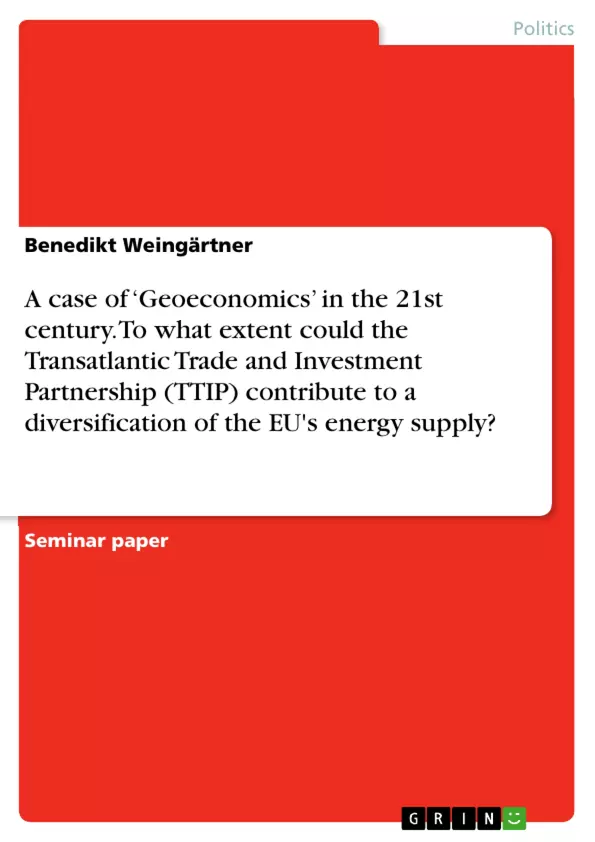Since the end of the Cold War, military capacities as a means of geopolitical power have been considered to become less important in favour of economic issues. But even though the latter do not have the same obvious striking force as gun power, certain economic aspects can also represent a fundamental element of national security.
For the European Union, one of ‘well identified areas’ in order to protect the economy is energy supply, respectively energy security. Since the number of countries that deliver most of the oil and gas to the EU is very small and some of them are involved in geopolitical quarrels, the EU seeks to diversify its energy supplier structure. One opportunity to do so might be the Transatlantic Trade and Investment Partnership (TTIP).
In this paper, I argue that TTIP is supposed to be, among others, a geoecomomic tool of the EU in order to diversify its energy suppliers and to reach more energy security, but this will only work on a medium to long term perspective and to a limited extent.
Inhaltsverzeichnis (Table of Contents)
- Introduction 'Geoeconomics', energy security and TTIP.
- Counteracting the EU's energy supply dependencies – TTIP as a 'geoeconomic' tool?
- Possibilities and limits of US energy exports to the EU.
- Conclusion - US energy exports: untapped potential to diversify the EU's supply but not a secured and definitive solution.
Zielsetzung und Themenschwerpunkte (Objectives and Key Themes)
This paper examines the potential role of the Transatlantic Trade and Investment Partnership (TTIP) in diversifying the EU's energy supply and enhancing its energy security, particularly in light of the EU's heavy dependence on Russian energy imports. The analysis explores the implications of 'geoeconomics' and the potential for US energy exports to the EU within the framework of TTIP.
- The EU's energy security challenges and the importance of diversification
- The role of 'geoeconomics' in international relations and energy security
- The potential of TTIP to facilitate closer EU-US energy cooperation
- The possibilities and limitations of US energy exports to the EU
- The impact of the US 'shale revolution' on global energy markets
Zusammenfassung der Kapitel (Chapter Summaries)
- Introduction 'Geoeconomics', energy security and TTIP. This chapter introduces the concept of 'geoeconomics' as a crucial factor in understanding the relationship between international economics, geopolitics, and security. It emphasizes the EU's energy security concerns, highlighting its dependence on energy imports, particularly from Russia. The chapter then sets the stage for the discussion of TTIP as a potential 'geoeconomic' tool for the EU to diversify its energy suppliers and enhance energy security.
- Counteracting the EU's energy supply dependencies – TTIP as a 'geoeconomic' tool? This chapter examines the EU's vulnerability due to its energy dependency on Russia and other external actors. It explores the potential of TTIP to contribute to the EU's energy diversification by facilitating closer energy cooperation with the US, particularly in the context of the US 'shale revolution'.
- Possibilities and limits of US energy exports to the EU. This chapter delves into the feasibility and challenges of US energy exports to the EU. It explores factors such as infrastructure limitations, regulatory frameworks, and geopolitical considerations that could influence the flow of US oil and gas to the EU.
Schlüsselwörter (Keywords)
The paper focuses on the key terms and concepts of 'geoeconomics', energy security, energy diversification, the Transatlantic Trade and Investment Partnership (TTIP), the US 'shale revolution', and EU-US energy cooperation.
Frequently Asked Questions
How could TTIP impact the EU's energy supply?
TTIP is examined as a potential geoeconomic tool that could help the EU diversify its energy sources, particularly by facilitating energy exports from the United States.
What is the role of 'geoeconomics' in this context?
Geoeconomics refers to the use of economic instruments to promote and defend national interests and produce beneficial geopolitical results, such as energy security.
Why does the EU want to diversify its energy suppliers?
The EU seeks diversification to reduce its heavy dependence on a small number of suppliers, notably Russia, and to mitigate risks associated with geopolitical conflicts.
What are the limitations of US energy exports to the EU?
Potential limitations include infrastructure constraints, regulatory frameworks, and the fact that US exports may only provide a medium to long-term solution.
What is the 'shale revolution' mentioned in the paper?
The US shale revolution refers to the rapid increase in domestic oil and gas production, which has significantly altered global energy markets and created export potential.
- Quote paper
- Benedikt Weingärtner (Author), 2017, A case of ‘Geoeconomics’ in the 21st century. To what extent could the Transatlantic Trade and Investment Partnership (TTIP) contribute to a diversification of the EU's energy supply?, Munich, GRIN Verlag, https://www.grin.com/document/370778



